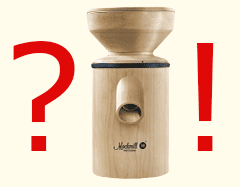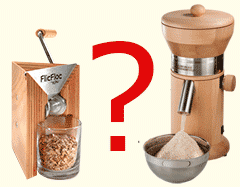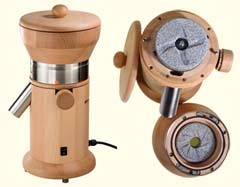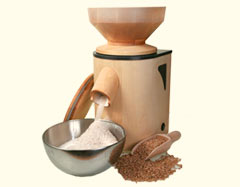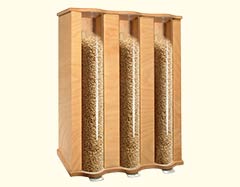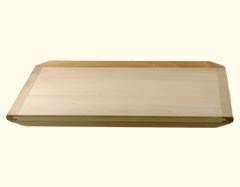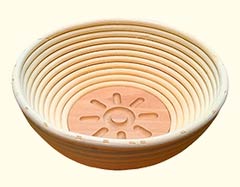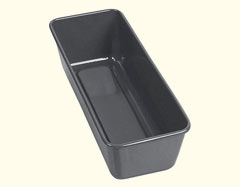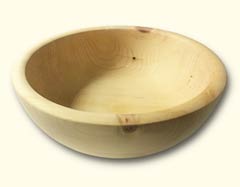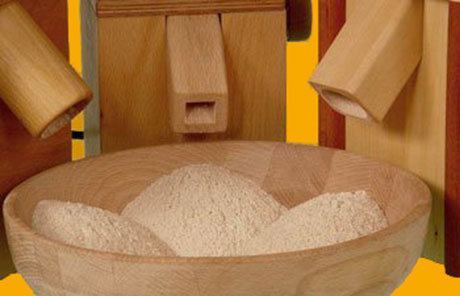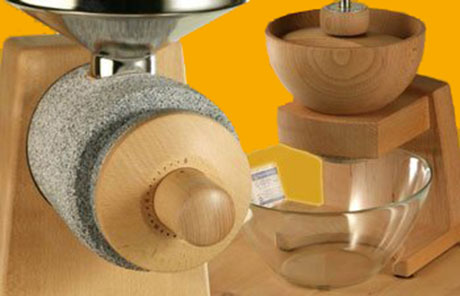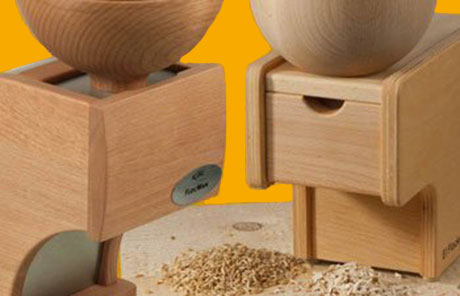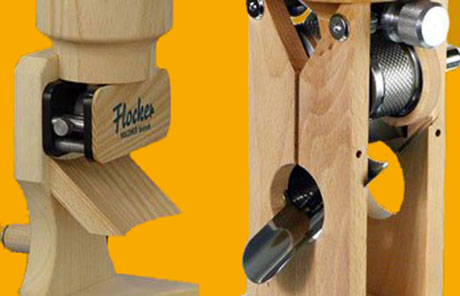Grain Mills Sorted by Watt
Grain mills from 250 watts power input

250W·100g
299,- €

250W·100g
369,- €

250W·100g
299,- €

250W·100g
469,- €
Beginner mills and for occasional grinding
Grain mills in this performance class are also often referred to as entry-level mills, as if they were not as high-quality and powerful. But for their size, they are actually very powerful with their industrial motors (designed for high loads and longer service life) and fully suitable for wholefood baking at home. They usually grind just as finely as the larger grain mills of the respective manufacturers, only a little slower. There is only one problem sometimes when switching on: It can happen that the mill does not start immediately with a fine setting if there is still grain in the Gr. Chamber from the last grinding. But this problem is easily solved by setting the mill to a coarser setting and returning it to the desired fineness as soon as it has started.
And please note: Even if manufacturers state that mills of this class also grind maize, we would not recommend such a small mill for maize, as maize is so hard that the mill is overtaxed with it in our estimation. In addition, the small mills often have problems with larger grains such as maize and chickpeas entering the Gr. Chamber. Therefore, pay attention to the explicit statement of the manufacturer that maize can also be ground.
Summary
Perfect and convenient purchase if you want to make both wholemeal flour and wholemeal flakes yourself.
Grain mills from 360 watts power input

360W·100g
279,- €

400W·100g
249,- €

360W·100g
299,- €

400W·180g
398,- €

360W·125g
299,- €

360W·125g
299,- €

400W·180g
430,- €

319,- €
319,- €

360W·125g
389,- €

400W·120g
436,- €

360W·100g
389,- €

400W·65-100g
460,- €

360W·100g
419,- €

360W·125g
389,- €

400W·120g
520,- €

360W·100g
459,- €

360W·100g
459,- €

360W·100g
459,- €

400W·130g
550,- €

360W·125g
449,- €

400W·120g
495,- €

400W·65-100g
660,- €

400W·170g
750,- €

350W·90g
ab 586,- €

350W·90g
ab 649,- €

400W·100-165g
820,- €

360W·100g
ab 748,- €
Standard class mills
These mills all grind at least 100 g per minute. The Widukind even manages 180 g/min, the Family a proud 170 g/min. With such grain mills, you usually don't have any problems starting up. Some also grind maize and hard grains, although for maize we prefer to recommend the more powerful mills from 600 watts upwards, because they simply grind faster and maize takes much more time than grain. With the high load, the motor also switches off earlier than with more powerful mills.
Summary
Full-size grain mills, relatively durable and well equipped for all occasions. The flour becomes somewhat finer with larger grindstones. Some also grind maize. Best choice for higher demands and people who do not only grind occasionally and small amounts for muesli.
Grain mills from 550 Watt power input

600W·200g
349,- €

360W·220g
399,- €

360W·220g
419,- €

600W·200g
499,- €

600W·300g
ab 558,- €

600W·200g
539,- €

600W·220g
559,- €

360W·220g
489,- €

600W·220g
549,- €

600W·220g
719,- €

600W·200g
769,- €

1100W·800g
ab 840,- €

500W·250g
998,- €

550W·170g
ab 1197,- €

1100W·240g
2190,- €

1100W·240g
2090,- €

900W·300g
2249,- €

4kW·2kg
3960,- €
Grain mills for enthusiasts
You could say the royal class. They convince with their strength (optimal grinding even of maize) and faster grinding process. To demonstrate that its mills also grind hard things without any problems, the manufacturer has recorded a video (Salzburger MT12) in which pebbles are ground. Since grain mills are generally relatively noisy, it is also pleasant if the grinding process is shortened.
Summary
Endurance and speed make the powerful mills favourites for frequent grinders and those who predominantly grind maize, chickpeas, buckwheat and other hard grains.
Continuous runners with 360 and 600 Watt power consumption
Professional mills for hours of grinding
These grain mills are technically identical to the usual household mills with the one difference that they can grind considerably more quantities of grain in one pass without shutting down due to overload.
Summary
Only necessary and sensible if you want to grind several kilos of grain or hard grains such as maize or chickpeas in one pass.
Combination mills from 250 watts - grain mill and flaker

250W·100g
469,- €

360W·100g
589,- €

360W·110g
739,- €

360W·100g
719,- €

400W·130g
895,- €

600W·200g
919,- €
Comfortable grain milling and crushing
Combination mills are equipped with a stone grinder and a grain crusher. You can use them to produce wholemeal flour and cereal flakes. Compared to single units, they are space-saving and often cheaper to buy. The FidiFloc combination mills work with an electrically operated stone mill and amanually operated grain crusher (FlicFloc), which can be removed if you want to take it with you when travelling. Unlike hand-operated grain mills and hand flakers, combi mills do not require a table edge for attachment.
Summary
Perfect and convenient purchase if you want to make both wholemeal flour and wholemeal flakes yourself.
